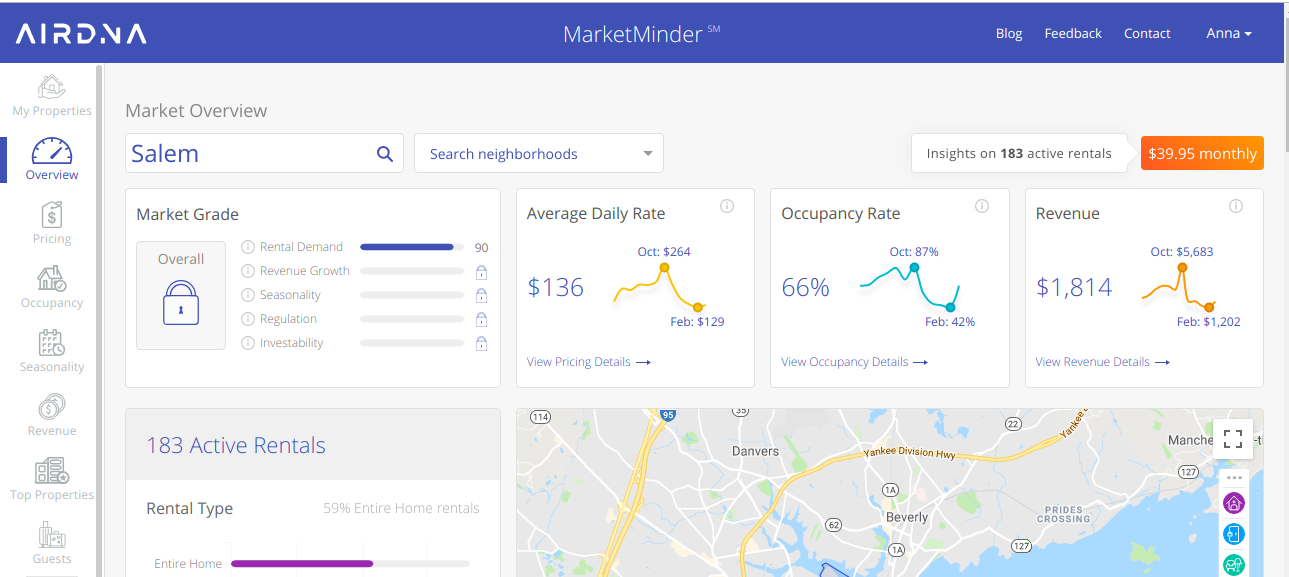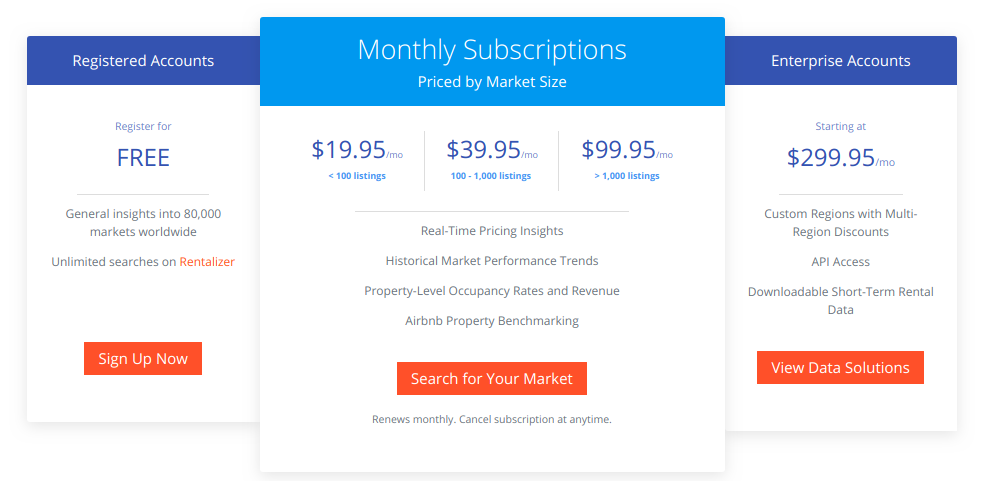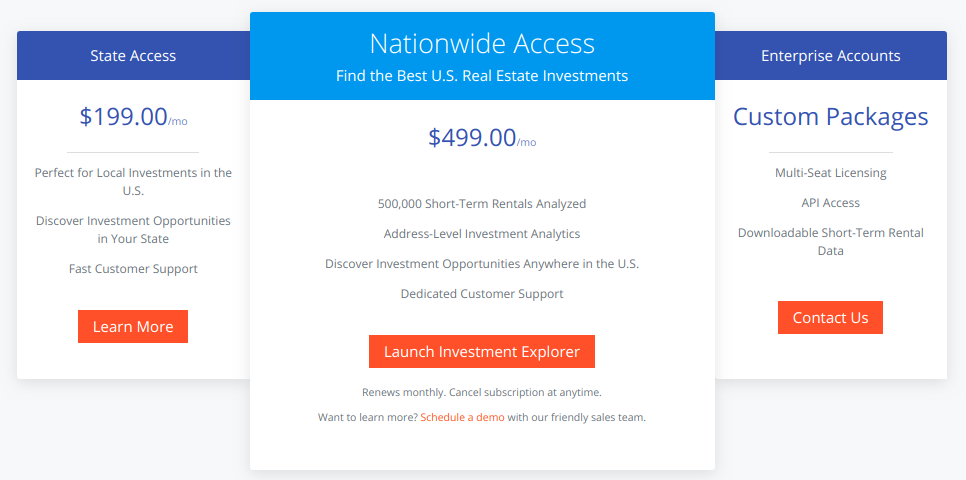If you've ventured into the world of short-term rentals, then welcome to a great job or side hustle. You may be renting out of your home or considering buying another building just for your Airbnb business. However, before you leap, you'd better look at the metrics for your neighborhood. Knowledge, as they say, really is power. For example, what's the average daily rate of your nearby competitors? What's the occupancy rate of the brownstone down the street? AirDNA lets you figure out the sharing economy from the inside. But is it worthwhile to tack another service onto what already seems like a no-lose situation? To find out, read our AirDNA review!
What's AirDNA?
Started by Scott and Will Shatford in 2015, AirDNA is a smallish company based in the Denver, Colorado area. However, it analyzes short-term rental markets around the world, covering over 40,000 cities and 750,000 properties in the US alone. It deals with big data, which is a term for enormous amounts of information. In other words, it collects and analyzes your local Airbnb short-term rental (STR) market. The point is to empower people who are in the STR business with data about their performance versus that of their competitors. It can give property owners ideas about demand in their area.
👉 Related reading: How To Sell Internet Data And Earn Money
AirDNA has a couple of products. Market Minder does pretty much what the name suggests: it watches your local STR market for trends. If you're a current host, this may be the most useful tool that this company provides. The other AirDNA service is called Investment Explorer. It's probably most relevant to people who want to buy or rent property to list it. There are also some enterprise products available that focus on analyzing trends, figuring out where your guests come from and trying to predict the future of your market.

How Does it Work?
Every day, AirDNA uses a method of online information-gathering called web scraping to compile information on over 4 million short-term rental records. Web scraping sounds scary, but it's completely legal. AirDNA has a program that reads Airbnb, HomeAway, and other STR websites very thoroughly every day and records everything it sees. Over time, it gathers enough data about price, property location, and the concentration of rentals in an area to produce a valuable snapshot of the market of rental properties. Users can narrow the data down by zip codes, but not by street or neighborhood.
What Information Does It Provide?
AirDNA is comprehensive. Here are a few metrics that it produces:
- The number of professional hosts in an area.
- Average daily rate for rental listings in an area.
- How the average daily rate has changed recently.
- Occupancy rate and its recent trends.
- Seasonality information, meaning that it compares activity in high and low rental seasons.
- Regulatory information.
- Revenue details, including annual revenue.
Useful Presentation
Theoretically, you could compile and analyze all this information on your own spreadsheets at home. After all, AirDNA doesn't have a back door into Airbnb's database; everything they show you came from the front end of the website. But even though you could do the same thing manually, the size of the Airbnb data set would make that hard.
Plus, even if you did spend hours gathering that data, you wouldn't be able to look at it in a useful way. The way that AirDNA presents the information in graphs, charts, and color-coded calendars is at least as valuable as the information itself. There's no math (or information science) needed on your part.

It's not hard to see how property managers could use this service. However, there are a lot of people whose businesses intersect with STR who may also find AirDNA's service beneficial. Here's how.
Possible Uses
Suss Out The Competition
One of the things AirDNA does well is comparison. It'll show you which properties are doing best in an area, for example, and you'll be able to see how many super hosts you're competing within your area. It also lets you see how specific types of rentals are succeeding in your market. For example, if you only want to see the occupancy rate of 2-bedroom apartments, you can do that.
This means that you can micro-compete. If you also have a 2-bedroom to rent, you'll be able to compare your prices and performance against that particular market instead of the entire range of STR properties.
Streamlining Your Pricing Model
If the other Airbnbs in your neighborhood have been steadily raising prices for the last year, you really ought to know about it. Pricing strategy is truly key to your ability to make your rental a success. AirDNA can tell you when your off-season is, for example, which can prompt you to adjust your daily rate. If your revenue growth is slow or your average occupancy rate low, AirDNA could tell you why.

Notably, this could be a useful service for professional hosts or moonlighters. However, people who only keep one room in their apartment and rent it out once in a while might not find AirDNA worth the cost.
Deciding Where To Buy
If you've got some experience in STR already, then you may be playing with the idea of buying additional properties. HomeAway, Airbnb, and the other apartment sharing apps that you use are now a way of life for you– and, more importantly, they're your major source of income.
Before you decide where to establish your STR kingdom, you're going to need to know what areas are profitable. Otherwise, you could blow hundreds of thousands of dollars on a property that you can't rent. If you want your business to succeed, then you need to do research before investing. AirDNA is a great way to accomplish that. Look for top-rated places that exhibit a lot of stable, if not upward, trends.
Real Estate Research
Non-renting real estate investors and home buyers also need to be aware of the effect Airbnb can have on a neighborhood. In some desirable areas, STR entrepreneurs are buying entire houses and turning them into multiple Airbnb apartment units. This lowers the availability of housing in general and may cause rent to rise. It can also have a deleterious effect on the neighborhood's character. Short-term renters won't be as invested in the community as long-term residents. They're on vacation and just want to have a good time. As a real estate agent, you'll be serving your customers well if you know about the STR activity in your city.

Fine-Tune Your Cancellation Policy
One of AirDNA's most useful features is its analysis of lead time. Booking lead time is the amount of time that a room is booked in advance. In other words, it indicates whether someone books an Airbnb five days in advance or five months.
The average lead time of an area can tell you a lot about supply and demand. If you find that the area where your property is located tends to book up fast at a certain time of the year, you might find that you're OK with maintaining a relaxed cancellation policy during those days. After all, you can always get another customer. However, when lead time is shorter or rental demand drops, you could change your rules accordingly to force customers to follow through with their stay.
👉 Related reading: How To Save Money On Your Business Phone Service
Figure Out If You Want To Host
Making revenue from an Airbnb can be harder than it seems. Without knowing the rental market around you, you'll have no idea whether your area is already chock-full of empty short-term rentals. You won't know who you're competing against, either. If your neighbor has set a low rate on their multiple vacation rental listings, you ought to know before you set what you think is a fair price on your one available room!
On the other hand, if your area's average daily rate is high and active listings disappear quickly, then you might want to scale up your business and buy an investment property. Booking short-term rooms in a high demand area can net three times the amount of rental income as long-term rentals.

What AirDNA Does Not Do
AirDNA does a great job of presenting information to its users. This can include some great representations of trends that appear to be completely obvious. If the annual number of guests in your zip code has been rising for the past two years, there's a good chance that trend will continue. AirDNA does some limited future modeling so that you can get an idea of where the market might be going. However, life includes nuance that this numbers-crunching company doesn't incorporate.
For example, maybe guests are renting in your city because a nearby startup has been hiring aggressively for the past few years. Once the startup stabilizes (or goes bust) that trend, which relied heavily on potential hires coming to town for interviews, might stop. With AirDNA, you'll be able to see that trend halt and reverse, but you might never know why. If a new hotel opens in your city, that could affect your rental market immediately.
Likewise, AirDNA doesn't know what hosts are doing in terms of customer service. If short-term rental landlords start giving away concert tickets with every reservation, you may not be able to compete. Analytics can tell you what's happening, but not why or how to respond. That part of the puzzle is up to you.
Customer Service
Users report an unusually positive experience with AirDNA. The company maintains a sales and service office in Spain, but was started and is headquartered in Colorado. According to Owler, the company has less than 50 employees. This, plus the relative newness of the company may contribute to its particular attention to negative feedback. It normally addresses customer complaints within 48 hours of receipt. It posts its numbers clearly on a highly accessible contact page and it seems genuinely pleased to interact with customers. Reviews are remarkably high and the STR community generally appreciates the company's work.

Costs
The Free AirDNA Demo
Here's the good news: AirDNA supports a free demo! The version of Market Minder that account holders can access prior to paying is very limited. Certain metrics, such as the market grade and exact pricing details, are unavailable through the free module. However, you can view general trends there. For example, it's possible to see that Salem, Massachusetts has 183 rentals and a high season in October. Since this is when its annual Halloween festival occurs, it makes sense that this would be the biggest month of the year. However, in free mode, it's impossible to see more specific particulars.

Paying For Full Access
AirDNA's pricing operates per product and on a sliding scale that goes on how many rentals are on the market in your area. For example, if your market has under 100 hosts, you'll only pay $19.95 per month for MarketMinder. If your area supports over 1000, you'll pay $99.95. If you're very fancy, then you'll get an enterprise account for $299.95 per month.
Investment Explorer is pricier, starting at $199.00 for access to statewide information. Enterprise access for this product is apparently custom – you'll need to contact the company for more information.
MarketMinder Pricing

Investment Explorer Pricing

AirDNA Plus Other STR Costs
Anyone who has ever let people stay in their house knows that there's a certain amount of investment involved in being a good host. If nothing else, your valuable time is worth something. If you're not sure about the particulars of short-term rentals, then you need to check out our post on Airbnb vs. renting. There are a lot of considerations involved, from co-occupying with a guest to answering texts from strangers. However, one thing's for sure: you need to factor in all costs before you commit.
The cost of taxes alone will cut into your profits, and locks, laundry bills, and cleaning services may all be necessary. STR services also take a percentage of the booking. Add those up before you add AirDNA to the pile and examine your revenue. Flagging rental activity could mean that you need more information on an area, in which case, AirDNA is a good investment. However, if paying for a subscription means you'll lose money, then try the free demo and see what you can get out of it before you pay up.
Competitors
Some investors want to play it very safe, and as financial gurus, we support that! Look into your alternatives before committing to one rental analysis company. AirDNA has a competitor that may also be worth checking out.

Beyond Pricing started around 2013. It's a real estate analytics company that integrates very actively with STR accounts. One of its principal services is automatic rate adjustment, which reacts to changes in the local rental market. While this sounds like a good thing at first, it could be a mixed blessing. After all, automatic price adjustment doesn't always work well without a human hand on the wheel.
In terms of cost, Beyond Pricing takes a percentage of your revenue instead of a flat rate. Landlords who are just starting out might find that a better model than AirDNA's subscription plan. However, Beyond Pricing's interface also isn't as intuitive and easy to use as AirDNA. There are no good-looking charts or straightforward grades. Instead, Beyond Pricing relies on calendars and its assumption that you already kind of know what you're doing.
Pros And Cons
Pros
AirDNA clearly provides a valuable service. If you're serious about making Airbnb your business, then it could easily earn back more money than it costs you. In other words, AirDNA could pay for itself if you leveraged its information intelligently.
The fact that the interface is easy to read is a tremendous advantage. You're a landlord, not a data scientist! You shouldn't have to labor over spreadsheets.

Cons
Like any valuable service, AirDNA can get quite pricey. If you want to ease into STR, but your area is already chock-full of vacation rental units, then you might not be able to use MarketMinder immediately. You may not yet know if your Airbnb business can support $100 every month just for data analytics!
| Pros | Cons |
|
|
The Verdict
AirDNA is worth the money if your rental fits one of a few different profiles.
- You're one of the first or relatively few STR landlords in your area
- Your STR business is already going very well and you want to expand it
- You are a professional investor
Most Airbnb or HomeAway hosts aren't going to need to use a tool this involved. It's gorgeous and makes a great toy, but if your STR is your side hustle, then you probably don't need to splurge on this tool. If you know your city well, then you already know when your peak time is. You may be able to run your Airbnb profitably without knowing a ton of metrics, too. Lots of people make short-term rentals work without doing more than snapping some photos and laying out fresh towels.

If this all sounds like a little more than you bargained for, don't despair. There are lots of ways to make your housework for you! Check out our list of the seven best ways to earn money with your home.
Continue reading:

